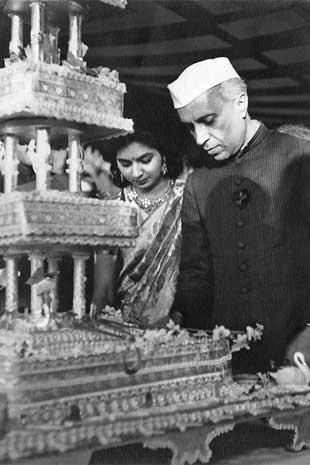Nayantara Sahgal: A Legacy of Literature and Courageous Expression
Nayantara Sahgal, an acclaimed Indian writer, intellectual, and political commentator, is one of the prominent figures in contemporary Indian literature. Her works, deeply influenced by her political and personal experiences, have left an indelible mark on Indian literature, often blending themes of freedom, identity, and social justice. With a legacy as strong as her pen, Sahgal’s life and work continue to inspire readers and thinkers worldwide.
Early Life and Education
Born on May 10, 1927, in Allahabad, Nayantara Sahgal is a member of the influential Nehru-Gandhi family. Her father, Ranjit Sahgal, was a distinguished politician and her mother, Vijaya Lakshmi Pandit, was an esteemed diplomat. She is the niece of Jawaharlal Nehru, India’s first Prime Minister, which placed her at the very heart of India’s political and intellectual developments during the post-independence period.
Sahgal was raised in an environment rich in intellectual and political discussions, which undoubtedly shaped her views and passion for literature. She was educated at prestigious institutions in India and abroad, including Somerville College at the University of Oxford. Sahgal’s education allowed her to absorb various political ideologies, literary traditions, and the essence of human rights, all of which would later influence her writing.
Literary Career and Contributions
Nayantara Sahgal’s literary career began in the early 1950s, with her first novel, “A Time to be Happy” (1958), marking her entry into the world of literature. Over the years, she wrote several novels, short stories, and essays that garnered widespread critical acclaim. Her writing is known for its rich prose, insightful character portrayals, and the strong political undertones that often reflect her own personal experiences with India’s political landscape.
One of her most renowned works, “Rich Like Us”, won the Commonwealth Writers’ Prize in 1985. The novel provides a gripping exploration of India’s political struggles during the Emergency period of the 1970s and critiques the growing political repression. The book’s portrayal of social unrest and political power struggles resonated deeply with readers, both in India and abroad, and earned Sahgal a reputation as one of India’s most fearless writers.
Her other notable works include “The Day in Shadow”, “Mistaken Identity”, and “The Silver Lining”. Throughout her career, Sahgal’s writings often tackled the complexities of freedom, social justice, and human rights. Through her characters, she explored the personal toll of political and social struggles and often critiqued the inequality and oppression that existed in Indian society.
Political Influence and Activism
Nayantara Sahgal was not only a writer but also a prominent political figure. Having grown up in a family deeply involved in the Indian political scene, it is no surprise that Sahgal’s works often reflect her commitment to democracy, equality, and human rights. As a political commentator, Sahgal was outspoken about the challenges facing India’s democracy, particularly during the Emergency period in the 1970s when Prime Minister Indira Gandhi imposed widespread censorship and curbed civil liberties.
Sahgal’s experiences with political suppression deeply impacted her writing. She became an advocate for freedom of speech and expression. In 2015, Sahgal made headlines when she returned the Sahitya Akademi Award in protest against rising intolerance and the suppression of free speech in India. This courageous decision earned her both admiration and criticism but underscored her steadfast commitment to the values she held dear. It was a bold stance against the increasing political repression and intolerance in the country.
Daily Life and Personal Beliefs
Throughout her life, Nayantara Sahgal remained deeply committed to her values of freedom, justice, and equality. She lived a relatively private life, but her commitment to her work and beliefs made her a public figure in her own right. Her personal beliefs, rooted in a belief in democracy and the importance of free thought, are visible not just in her books but also in her actions. Sahgal was known for her courageous stance on issues of public importance, always willing to speak out against injustice, no matter the consequences.
Her daily life revolved around her passion for writing, social activism, and a deep involvement in the political discourse of India. A staunch believer in women’s rights and empowerment, Sahgal used her platform to advocate for gender equality and the importance of education in uplifting women and marginalized communities.
Significance in Society
Nayantara Sahgal’s contributions to literature and society go far beyond the pages of her books. Her fearless critique of the political and social climate in India has made her an important voice in the fight for democratic values and civil rights. She played a vital role in documenting the changes in Indian society, from the struggles for independence to the complexities of post-independence governance.
As an intellectual and political commentator, Sahgal brought attention to the rising authoritarianism and intolerance in the country. Her voice continues to inspire writers, activists, and human rights defenders who fight for a world where freedom of expression and social justice are upheld. Her legacy is also reflected in her continuous advocacy for pluralism and inclusive governance.
Frequently Asked Questions (FAQs)
Q1: What is the significance of Nayantara Sahgal’s writings?
Nayantara Sahgal’s writings are significant for their critical examination of India’s political and social landscape. Through her works, she has explored themes such as democracy, freedom of speech, social justice, and political corruption, making her one of India’s most influential authors.
Q2: How did Nayantara Sahgal contribute to Indian political thought?
Sahgal contributed to Indian political thought by challenging the status quo, especially during times of political repression. Her courage in speaking out against rising intolerance and authoritarianism continues to resonate with contemporary discussions on democracy and human rights.
Q3: What was the impact of Nayantara Sahgal returning the Sahitya Akademi Award?
By returning the Sahitya Akademi Award in 2015, Nayantara Sahgal made a powerful statement against the increasing intolerance in India. This act of protest was significant in highlighting the dangers of censorship and the suppression of free speech.
Conclusion
Nayantara Sahgal’s life and work embody the spirit of resilience, courage, and intellectual integrity. Her legacy as a writer, political commentator, and activist has left an indelible mark on the literary world and society at large. Through her books, her activism, and her personal example, she continues to inspire those who fight for freedom, equality, and justice. Nayantara Sahgal’s contributions to Indian society are profound, and her work remains a beacon of light for those who believe in the power of words to bring about change.










